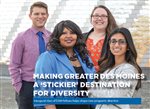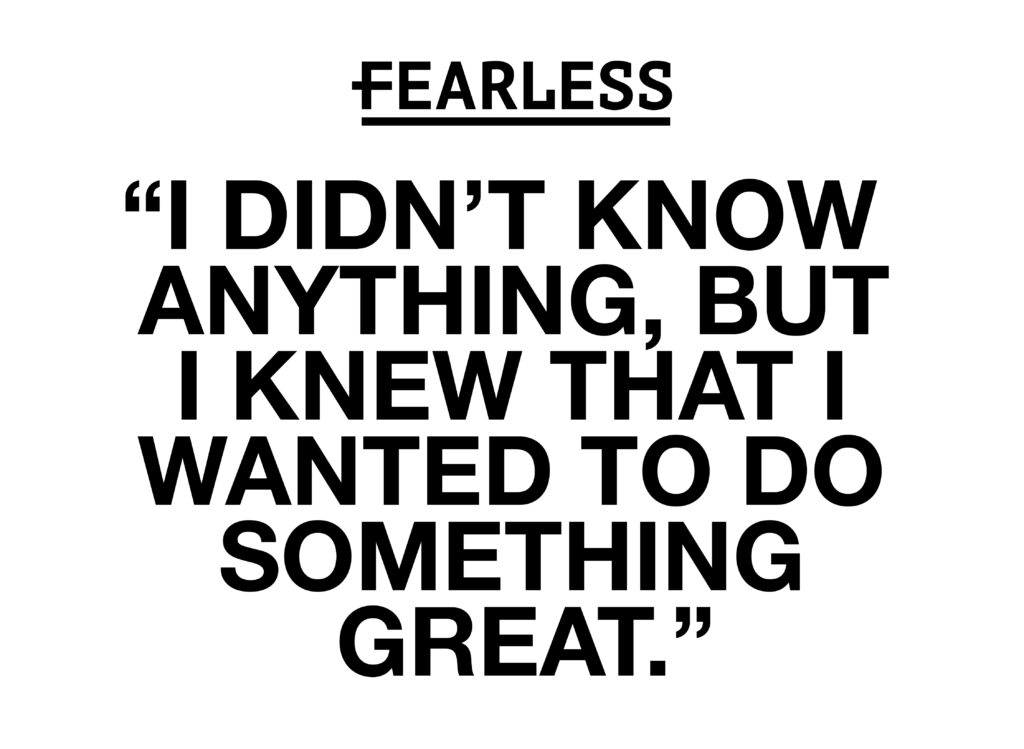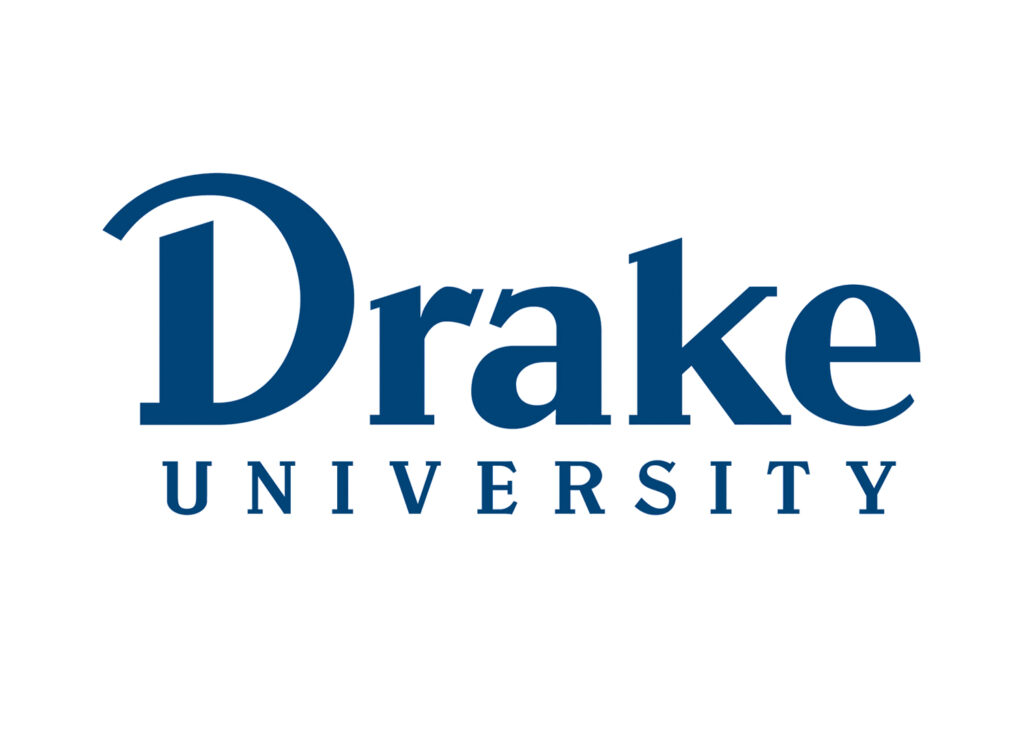Making Greater Des Moines a ‘stickier’ destination for diversity

When Central Iowa business and community leaders travel to Washington, D.C., next year for the Greater Des Moines Partnership’s 40th annual lobbying trip, they’ll be joined by a particularly enthusiastic group of 24 young professionals known as the DSM Fellows.
Launched by the Partnership in June, the DSM Fellowship Program is taking the hand-picked group of diverse, high-potential leaders through a two-year curriculum of leadership development courses, community projects and professional networking activities designed to embed them in the community and to help them become highly engaged and more likely to stay.
The initiative is based on a highly successful fellowship program developed by the Indianapolis business community to attract and retain college graduates in Indiana — the Orr Fellowship. Named in honor of former Indiana Gov. Robert Orr, the program was started in 2001 to match graduating college seniors with Indiana companies for a two-year fellowship.
Mary Bontrager, the Partnership’s executive vice president of talent development, credited Matt Haney, vice president and deputy general counsel with Deere & Co., with bringing the idea for replicating the program in Des Moines. Haney’s daughter was selected as an Orr Fellow after graduating from Notre Dame University.
Bontrager said the Partnership developed its own version of the program, with a couple of important variations from Indiana’s structure.
“One, fellows do not have to be graduates of Iowa colleges and universities,” she said. “We also wanted a strong focus on a diverse group of fellows in the program. We hear a lot from our employers of their challenges in attracting diverse talent, but even more so on the back end of retaining that talent. Some of that is because they don’t necessarily find their community here, that network of friends and colleagues that have similar interests and backgrounds as they do.”
For the initial class, the Partnership approached a number of large employers and asked them to identify recent graduates they had hired who would be a good fit for the program. The professional training curriculum for the program, developed by a Partnership committee under Bontrager’s leadership, is being delivered by Tero International.
“The curriculum is very intentional — training that many companies would offer to midlevel professionals,” Bontrager said. “So it’s all about giving them this experience early on in their careers that they will build on. Many of them later will likely go through some leadership program.”
Once the program has completed its first two-year cycle, the DSM Fellowship will shift into a true recruiting program to seek subsequent participants.
“We will then go on college campuses to recruit those soon-to-be high-potential college graduates, so they will come here not only for career opportunities, but also to participate in the fellowship program,” Bontrager said. “So it’s really serving a niche in the long term as a recruiting tool and also as a retention tool.”
Bontrager anticipates on-campus visits to begin next fall to build the candidate pool for the 2020-22 class. “Our intention, starting with the 2020 class, is that we will bring on board a new class every year,” she said. “We’re now trying to decide if with our capacity that makes sense. We’ll all have a better idea after we get through that full cycle.”
Andrea Woodard, the Partnership’s director of public policy and strategic initiatives, is coordinating the operational details of the program. On average, the group gets together two or three times per month, in a schedule that varies between professional development sessions, leader connections with the participating companies, social events and civic engagement projects.
Among the activities they’ve done has been a full-day retreat held at Camp Dodge, which included team-building exercises such as rappelling down a wall. They’ll attend the Partnership’s annual dinner in January as a group, and participate in the Day on the Hill at the Iowa Statehouse.
“The curriculum is laid out so that the group will travel together for the Partnership’s D.C. trip,” Woodard said. “In the second year, they will be asked to plan a forum or summit to present to the congressional delegation around a specific issue that they choose.”
Community engagement is also a significant part of the program. Bontrager’s team will identify four or five nonprofits that the fellows will work with in small groups to complete first-year capstone projects.
“They’ll know in advance which nonprofits so they can pick and choose which nonprofit fits best based on the group’s skill sets and where their passions align,” Bontrager said. “In year two, we’re going to encourage them to seek out community engagement opportunities on their own so they can start to live their passions.”
Diversity is another key element of the initiative. In recruiting from each participating company, “we said we wanted to have a strong focus on having a diverse group, with diversity of gender, industry, ethnicity and also diverse backgrounds,” she said. “It truly is a very diverse group.”
The ways in which the fellows have interacted with the programming has demonstrated that diversity, Woodard said.
“They ask questions that provide different perspectives than I think we sometimes bring to the table,” she said. For instance, following a presentation they heard about the Des Moines water trails project, one of the fellows raised a question about whether people from different backgrounds would feel welcome using the water trails.
Feedback from the fellows and their companies will be critical for shaping the program. As part of the process, each of the fellows will conduct a presentation at the end of the first year to update their supervisors on what they’ve learned and the impact it’s had on them.
Additionally, “we’re hearing back from those supervisors in the companies, and they’re providing feedback to us on what they’re hearing from the fellows and what they’re experiencing in the workplace, Bontrager said.
Future classes could potentially be tailored to specific industry needs, she said.
“Maybe one year we bring in a group focused in the IT industry, where we have high demand,” she said. “Right now we don’t have any small businesses participating, and I think that will be important moving forward to have some smaller companies involved. Just the experience of a smaller company versus a larger company would be valuable.”
How will success be measured?
“First and foremost, the program is a retention tool, but I think the best way to work with these individuals is to talk about their goals,” Woodard said. “Because if their goals and passions in the community are being met, then we’ve done our job. On the other side of that, it will be important to continue those relationships as they leave the program. Maybe there will be some opportunities to work with past classes for mentoring opportunities.”
“In the long term, we’ll be able to measure whether they’re staying in the community,” Bontrager said. “On a short-term measurement, all of the programming is evaluated by the fellows, so we have those evaluations telling us if it was worthwhile and they learned something they can put to use. So we’re gathering that feedback as we go. This is a long-term initiative, and we’re in this for the long haul.”
Angela Hoffman, consumer lending associate, Bankers Trust Co.
Angela Hoffman studied criminal justice and sociology at Des Moines Area Community College and Iowa State University. She started out working as a manager in a local company before joining Bankers Trust Co.
“I came to Bankers Trust because my father has worked here for several years, and I really felt it was a great place to work,” she said. “I would say the bigger reason is because of how broad Bankers Trust is [represented] in the community. Everywhere I went, I always saw branding for Bankers Trust, and I thought that was great. It made me feel like I was included, and wanted to be included.”
Hoffman is keenly interested in promoting diversity, and currently chairs the bank’s diversity and inclusion committee.
“A lot of people believe that diversity is all about black and white, and it’s not,” she said. “It’s about young, it’s about old, it’s about disabilities. The goal is to get that message out, that diversity is about everything, not one or two things.”
The lessons from the fellowship and her experiences through work will flow both ways, she said.
“Whatever I learn in the diversity and inclusion committee at work, I try to bring here. And whatever I learn here, I try to bring to work and give them more education about what we’re doing on a broader scale,” she said. “I think the DSM Fellowship is doing a good job in trying to make that balance and to make that known. Obviously they have things to work on as it’s their first year and they’re learning as they’re doing this, but I definitely think they will get there.”
Rob Gavaro, director, Mercy Connect
Rob Gavaro has been director of Mercy Connect, a transfer center program of Mercy Medical Center-Des Moines, for just over a year. He was raised in Falls Church, Va., and went to college in Maryland and graduated three years ago from Cornell University in New York with a master’s in health administration. While at Cornell, Gavaro met Mercy Network President Bob Ritz, who was taking the same master’s program, and Ritz recruited him to Mercy.
“I had actually never been to Iowa before, but came out here to interview and fell in love with the city, but more so the organization,” he said. “I thought if I was going to do something outside the box, that would be the time do it.”
In a similar fashion, Mercy-Des Moines President Karl Keeler recruited Gavaro to the DSM Fellows program.
“I thought it was an amazing opportunity, and it has been so far,” Gavaro said. “I’ve really enjoyed the sessions and experiences I’ve had with the program, and it’s been nothing but positive for me.”
A recent session on presentation skills was particularly helpful for Gavaro, who is regularly called upon to brief Mercy’s senior leadership team. “For me, just with some of the Tero work we’ve done so far, some of the [speaking] strategies that I’ve learned have been amazing and have really helped me to adjust the pace I’m speaking at and to eliminate some of the filler words that I use. It’s been a nice experience to evaluate myself and hopefully to grow from that.”
Swati Panchal, administrative fellow in health care administration, UnityPoint Health
Swati Panchal interned with UnityPoint Health while she was completing her master’s degree in health care administration from the University of Iowa. After she graduated, UnityPoint Health offered her a three-year administrative fellowship. UnityPoint’s vice president of human resources, Joyce McDanel, recommended her for the DSM Fellows program.
“My role as an administrative fellow, a lot of it is professional development and getting involved in the community to build those leadership skills so that at the end of three years I’m ready for a permanent position in the organization,” Panchal said. “This was just a great opportunity to develop my skills both personally and professionally.”
Having just completed the MHA program, she thought that the DSM Fellowship would repeat many things she had just learned. “But there is still so much more that I have learned through this program because it touches on it in levels you can’t do in one-hour courses,” she said. “It really does an eight-hour, daylong course. … It’s much more powerful.”
The program has also been valuable for building professional relationships beyond the health field, Panchal said.
“When you’re leaving college or graduate school, you just have these preconceived notions of what types of positions are available, but you see this group and they’ve just received wonderful opportunities, and you can tell why,” she said. “I didn’t think when we started that we would look forward to these daylong classes, but the retreats and all the things they’ve done have really had in impact in giving us a bond.”
Maggie Martin, marketing/communication specialist, Federal Home Loan Bank of Des Moines
Maggie Martin initially stayed in Iowa City to work for a marketing firm after graduating from the University of Iowa in 2016, but a job posting from the Federal Home Loan Bank provided the opportunity she had been waiting for to return to her hometown of Des Moines.
She joined the bank in January, and this summer was approached by her supervisor with the opportunity to participate in the DSM Fellowship program. “When I saw the opportunity and read more about what the program was going to be like, I thought it would be a perfect fit for me,” she said.
About six months into the program, “it’s been great,” she said. “Everyone is pretty equally motivated and driven, which is pretty exciting to be part of a group like this. We’ve all really bonded within the last few months. And it’s been really great to tour different companies and see how they’re run and how they deal with employees. We’ve done a lot of service and volunteer projects as a team, which has been great as well.”










